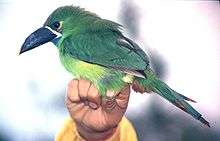Black-throated toucanet
| Black-throated toucanet | |
|---|---|
 | |
| Scientific classification | |
| Kingdom: | Animalia |
| Phylum: | Chordata |
| Class: | Aves |
| Order: | Piciformes |
| Family: | Ramphastidae |
| Genus: | Aulacorhynchus |
| Species: | A. atrogularis |
| Binomial name | |
| Aulacorhynchus atrogularis (Sturm, JHCF & Sturm, JW, 1841) | |
| Subspecies | |
|
See text | |
| Synonyms | |
| |
The black-throated toucanet (Aulacorhynchus atrogularis) is a near-passerine bird found in central Ecuador to western Bolivia.
Taxonomy and systematics
The black-throated toucanet was originally described in the genus Pteroglossus. Although not accepted by some authorities, the black-throated toucanet was split from the emerald toucanet to form a separate species.[2] While considered a species based primarily on morphology,[3] some authorities continue to consider it a subspecies of the emerald toucanet.[4][5] Alternate names for the black-throated toucanet include Andean toucanet and Peruvian toucanet.
Subspecies
Three subspecies are recognized:[6]
- Black-billed toucanet (A. a. cyanolaemus) - Gould, 1866: Originally described as a separate species. Found in south-eastern Ecuador and northern Peru
- A. a. dimidiatus - Ridgway, 1886: Originally described as a separate species. Found in eastern Peru to western Brazil and northern Bolivia
- A. a. atrogularis - (Sturm, JHCF & Sturm, JW, 1841): Found on eastern slope of Andes from northern Peru to central Bolivia
Description
Like other toucans, the black-throated toucanet is brightly marked and has a large bill. The adult is 30–35 cm (12–14 in) long and weight can range from 118–230 g (4.2–8.1 oz).[7][8] The sexes are alike in appearance, although the female generally is smaller and slightly shorter-billed. It is, as other members of the genus Aulacorhynchus, mainly green. The vent and tail-tip are rufous. The bill is black with yellow to the upper mandible and a white band at the base of the bill. The throat is blue or black and the eye-ring is very dark, almost appearing blackish from a distance. The legs are dull greyish and the iris is dark.
References
- ↑ BirdLife International (2014). "Aulacorhynchus atrogularis". IUCN Red List of Threatened Species. Version 2016.2. International Union for Conservation of Nature. Retrieved 3 November 2016.
- ↑ "Aulacorhynchus atrogularis - Avibase". avibase.bsc-eoc.org. Retrieved 2016-11-03.
- ↑ Navarro, A.; Peterson, A.; López-Medrano, E. & Benítez-Díaz, H. (2001). "Species limits in Mesoamerican Aulocorhynchus Toucanets". The Wilson Bulletin. 113 (4): 363–372. doi:10.1676/0043-5643(2001)113[0363:SLIMAT]2.0.CO;2.
- ↑ American Ornithologists' Union. 1998. The AOU Checklist of North American Birds. 7th edition w. supplements. ISBN 1-891276-00-X
- ↑ Dickinson, E. 2003. The Howard and Moore Complete Checklist of the Birds of the World. Christopher Helm. ISBN 0-7136-6536-X
- ↑ "IOC World Bird List 6.4". IOC World Bird List Datasets. doi:10.14344/ioc.ml.6.4.
- ↑ "Ramphastidae (Toucans, toucanets, & Aracaris)". www.nashvillezoo.org. Nashville Zoo. Archived from the original on 2007-08-19.
- ↑ Short, Lester L.; Horne, Jennifer (2001). Toucans, Barbets & Honeyguides. Oxford University Press. ISBN 0-19-854666-1.
